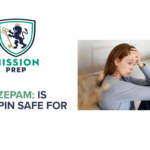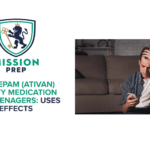The Benefits and Side Effects of Benzodiazepines for Teens

Mental health conditions such as anxiety and depression can profoundly affect a teen’s schoolwork, relationships, and life. As a parent, seeing your child struggle can feel like trying to find your way through dense woods at night without a compass. For instance, you might not understand the best approach to help them, or if medications are the right call for their needs.
Medications like benzodiazepines are sometimes prescribed to help with anxiety and other mental health challenges. For teens struggling with intense emotions, panic attacks, social anxiety, or other mental health problems, benzodiazepines might offer short-term relief. However, they’re not the first “go-to” treatment for teen mental health conditions.
For this reason, it’s important for parents to understand not only the benefits but also benzodiazepines’ side effects in teens. Short-term use of benzodiazepines for adolescents can be a life-changer, but only if this drug is used responsibly. This article can help as it breaks down…
- What benzodiazepines are and how they work
- How benzodiazepines can be used to treat certain teen mental health conditions
- The benefits of short-term benzodiazepine use for teenagers
- The potential side effects of benzodiazepines
- Alternative treatment approaches to benzodiazepines
- Where to find professional support for anxiety management and medication in teens

What Are Benzodiazepines?
Benzodiazepines are a class of drugs designed to calm the brain and central nervous system. They work by enhancing the effects of gamma-aminobutyric acid (GABA), a neurotransmitter responsible for reducing brain activity in specific areas. The result? A sense of calm, reduced anxiety, and relief from the overwhelming symptoms of panic and stress.1
Common benzodiazepine medications include:
These medications are typically prescribed to treat anxiety, panic disorders, seizures, and sometimes for sleep disorders, like using benzodiazepines for teenage insomnia.2 For teens who feel overwhelming anxiety or extreme panic attacks, benzodiazepines can feel like a lifeline – but only when carefully managed.
How Benzodiazepines Help Teens With Anxiety and Other Mental Health Issues
Your doctor can prescribe benzodiazepines for a wide range of reasons. Some of the most common reasons they might choose benzodiazepines vs other anti-anxiety medications in teens include the following.
Benzodiazepines for Panic Attacks in Teens
Sudden and repeated panic attacks- Fear of upcoming panic attacks
- Fear of death or losing control
- Physical symptoms like a racing heart or tightness in the chest
- Avoidance of places where panic attacks have happened before
Panic disorder can be a vicious cycle and needs to be treated in a timely way. This is why benzodiazepines for panic attacks in teens are sometimes an option. For instance, research shows that strong medications like alprazolam and clonazepam can help to quickly ease the intense symptoms of panic disorder.5 Having even a moment’s relief from panic attacks, mental clarity, and a sense of peace can help teens get back to their lives. Yet, it’s important to remember that benzodiazepines are only intended for short-term use.
How Benzodiazepines Help Teens With Anxiety
Teen anxiety and benzodiazepines often go hand in hand. For instance, experts agree that these medications can be highly helpful for pediatric anxiety. There are three types of anxiety more common in children than adults that benzodiazepines can help treat, including the following.6
Generalized Anxiety Disorder (GAD)
Social Anxiety Disorder
Teens with social anxiety disorder have an intense fear of social situations. This could show up as extreme fear of being judged or rejected, or avoidance of social interactions altogether.8 If a teen feels physical anxiety symptoms at just the thought of meeting others or avoids participating in school or other fun hobbies, benzodiazepines could work where other treatment options have failed.
Separation Anxiety Disorder (SAD)
Benzodiazepines for Teen Depression Treatment
Short-Term Use of Benzodiazepines for Adolescents: The Benefits of Benzodiazepines
The benefits of safe use of benzodiazepines for teens include that they can provide teens relief, are a good alternative to some other medications, and work quickly. The following are some of the detailed reasons why teen mental health and short-term benzodiazepines go hand in hand.
1. They Work Quickly
Unlike selective serotonin reuptake inhibitors (SSRIs), which may take several weeks to show noticeable effects, benzodiazepines work almost instantly.11 If a teen has a lot of anxiety that is severely impacting their daily life, their doctor may recommend benzodiazepines instead of SSRIs. The sooner they start to feel better, the sooner they can focus on longer-term mental health treatment for anxiety and other mental health problems.
2. They Reduce Feelings of Panic
Benzodiazepines can help teens regain control during a panic attack, preventing symptoms from escalating. Not only do panic attacks cause uncomfortable symptoms, but they can also lead to panic disorder. Benzodiazepines stop this cycle in its tracks. Again, this short-term effect is a band-aid that should be followed up with therapy and other skills, such as learning grounding techniques or mindfulness.
3. They Can Act as an Alternative to SSRIs
SSRIs can be highly useful medications for long-term treatment of depression and anxiety. But, for some children and teens, they might increase the risk of suicidal thoughts.12 Because of this, a doctor might switch a teen from an SSRI to a benzodiazepine – at least while getting suicidal thoughts under control.
They Can Help With Intense Stress
For teens coping with intense, short-term stressors (like a major school exam, public speaking event, or transitions like school changes), benzodiazepines can offer immediate relief. However, these stressors would likely have to create a severe impact on a teen’s life for a prescriber to consider benzodiazepines.
While these benefits can be life-changing in the right scenarios, it’s important to balance them with a clear understanding of the possible drawbacks.
The Side Effects of Benzodiazepines
Like all medications, benzodiazepines are not without their downsides – but they could create more significant issues than some others. Even when used as prescribed, they can cause unwelcome side effects that should be monitored closely.
Short-Term Benzodiazepines Side Effects
Using benzodiazepines incorrectly – even once – can lead to severe side effects. Severe side effects of benzodiazepines can include:13
- Severe drowsiness
- Slowed heart rate
- Low blood pressure
- Fainting
In addition, there are even reports of amnesia, hostility, irritability, and vivid or disturbing dreams when using these drugs. The DEA also reports that sedation, respiratory depression, coma, and death can result from an overdose of benzodiazepines.14
Long-Term Benzodiazepines Side Effects
One of the biggest risks of long-term benzodiazepine use in teens is developing a physical dependence on the drug. This means the body needs the drug to function properly, which can lead to benzodiazepines withdrawal symptoms in teenagers.
If your teen suddenly stops taking benzodiazepines, this can cause symptoms like:15
- Sweating
- Upset stomach
- Vomiting
- Headaches
- Heart Problems
- Seizures
- Death
For all of these reasons, stopping benzodiazepines safely in teens involves slowly tapering off the medication. Your doctor will create a schedule for you to gradually decrease the dosage until you are completely off the drug. This helps minimize withdrawal symptoms and allows your body to adjust slowly. Mission Prep can also create tapering plans for teens and their families.
Teen anxiety and benzodiazepines often go hand in hand. For instance, experts agree that these medications can be highly helpful for pediatric anxiety. There are three types of anxiety more common in children than adults that benzodiazepines can help treat, including the following.6
Alternatives and Holistic Approaches for Anxiety
Cognitive behavioral therapy (CBT): CBT is an evidence-based form of talk therapy that helps teens address negative thought patterns and develop healthier coping strategies. It’s a first-line treatment for anxiety disorders.- Mindfulness and stress-reduction techniques: Practices like meditation, breathing exercises, and yoga can promote relaxation and mental clarity and are what’s known as mindfulness practices. Practice makes perfect, so learning mindfulness techniques early on can help teens strengthen these skills and experience long-lasting anxiety relief.
- Other therapies: Anxiety might be a symptom of something bigger, such as an anxiety disorder like OCD or PTSD. This is why it’s important to get access to therapies like trauma-centered EMDR, ERP, or other treatments designed to treat the underlying causes of anxiety.
Exploring these options can help teens achieve sustainable mental health improvements without relying heavily on medication.
Mission Prep: Building a Healthier Path Forward
If you or your teen are considering benzodiazepines, remember that proper usage, education, and support systems are essential at every step of the way. At Mission Prep, we’re here to help guide you through the process of recovering from anxiety. We offer teens the help they need, whether it’s picking the right treatment plan, making lifestyle changes, or choosing the right medications.
Our nurturing treatment centers in California and Virginia offer teens the support and resources they need to learn how to manage their anxiety and mental health in healthy ways. We also offer medication management, therapy, and other evidence-based treatments to help teens build coping skills and improve their overall mental health.
Call our team today to learn more about our treatment packages and how we can help your teen on their journey to a happy and healthy life.

References
1-2. Bounds, C. G., & Patel, P. (2024, January 30). Benzodiazepines. StatPearls – NCBI Bookshelf. https://www.ncbi.nlm.nih.gov/books/NBK470159/
3. National Institute of Mental Health. (n.d.). Panic disorder. https://www.nimh.nih.gov/health/statistics/panic-disorder#part_2658
4. National Institute of Mental Health. (n.d.). Panic disorder: When fear overwhelms. https://www.nimh.nih.gov/health/publications/panic-disorder-when-fear-overwhelms
5. Susman, J., & Klee, B. (2005). The role of high-potency benzodiazepines in the treatment of panic disorder. The Primary Care Companion for CNS Disorders, 7(1). https://doi.org/10.4088/pcc.v07n0101
6. Pakyurek, M. (2022, October 6). Benzodiazepines in children and adolescents. The Carlat Report. https://www.thecarlatreport.com/articles/2711-benzodiazepines-in-children-and-adolescents
7. Johns Hopkins Medicine. (2024, April 16). Generalized anxiety disorder (GAD). https://www.hopkinsmedicine.org/health/conditions-and-diseases/generalized-anxiety-disorder
8. National Institute of Mental Health. (n.d.). Social anxiety disorder: More than just shyness. https://www.nimh.nih.gov/health/publications/social-anxiety-disorder-more-than-just-shyness
9. Feriante, J., Torrico, T. J., & Bernstein, B. (2023, February 26). Separation anxiety disorder. StatPearls – NCBI Bookshelf. https://www.ncbi.nlm.nih.gov/books/NBK560793/
10. Ogawa, Y., Takeshima, N., Hayasaka, Y., Tajika, A., Watanabe, N., Streiner, D., & Furukawa, T. A. (2019). Antidepressants plus benzodiazepines for adults with major depression. Cochrane Database of Systematic Reviews, 2019(1). https://doi.org/10.1002/14651858.cd001026.pub2
11. Chu, A., & Wadhwa, R. (2023, May 1). Selective serotonin reuptake inhibitors. StatPearls – NCBI Bookshelf. https://www.ncbi.nlm.nih.gov/books/NBK554406/
12. Pompili, M., Serafini, G., Innamorati, M., Ambrosi, E., Giordano, G., Girardi, P., Tatarelli, R., & Lester, D. (2010). Antidepressants and suicide risk: A comprehensive overview. Pharmaceuticals, 3(9), 2861–2883. https://doi.org/10.3390/ph3092861
13-15. National Alliance on Mental Illness. (2024, September 27). Risks of benzodiazepines. https://www.nami.org/about-mental-illness/treatments/mental-health-medications/risks-of-benzodiazepines/
14. Drug Enforcement Administration. (n.d.). Benzodiazepines. https://www.dea.gov/factsheets/benzodiazepines
16. Votaw, V. R., Geyer, R., Rieselbach, M. M., & McHugh, R. K. (2019). The epidemiology of benzodiazepine misuse: A systematic review. Drug and Alcohol Dependence, 200, 95–114. https://doi.org/10.1016/j.drugalcdep.2019.02.033



















